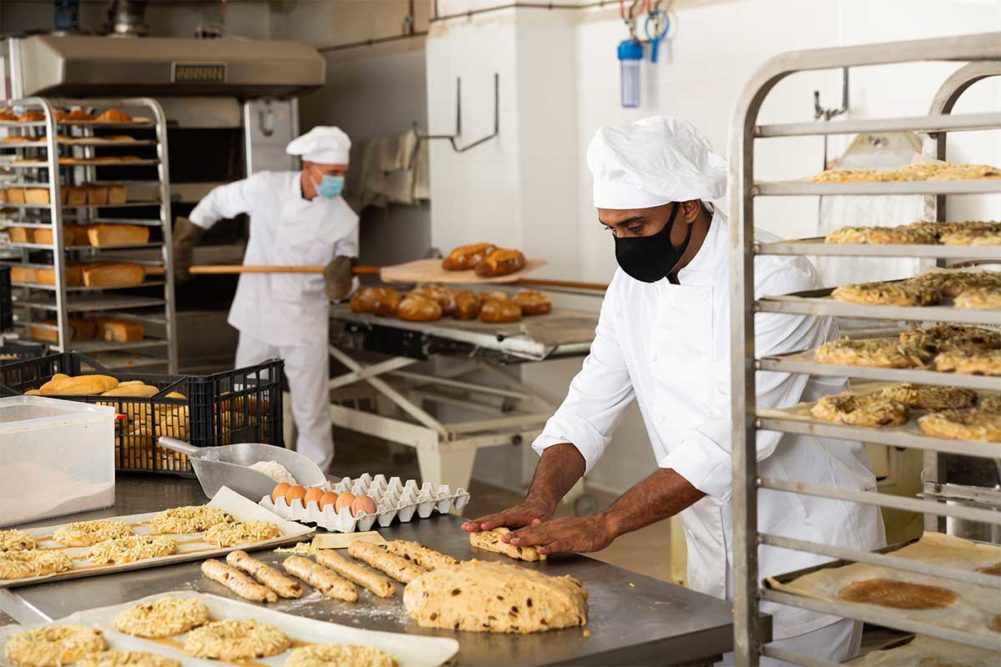WASHINGTON — The baking industry’s woes — labor and freight shortages, coronavirus concerns and an edible oils crisis — were laid bare in recent testimony before the US House of Representatives Agriculture Committee.
The American Bakers Association was represented by Ed Cinco, director of purchasing, Schwebel Baking Co., Youngstown, Ohio, at the Nov. 3 hearing on “The Immediate Challenges to our Nation’s Food Supply Chain.” Other food and agriculture groups also testified.
Mr. Cinco opened his testimony discussing the effects of the national labor shortage at Schwebel. The bakery was forced to delete some shifts from its typical round-the-clock production schedule due to high turnover during the coronavirus pandemic, resulting in fewer products delivered to retail and foodservice customers. Short staffs and a dearth of job applicants was not unique to Schwebel, he said, and labor issues at wholesale bakeries across the county threaten the efficacy of federal school breakfast and lunch programs, the Supplemental Nutrition Assistance Program and the special supplemental nutrition program for women, infants and children.
Next, Mr. Cinco pivoted quickly to a hot-button supply chain issue affecting nearly every sector of the US economy: transportation. In the baking industry, a shortage of qualified drivers has slowed movement of products through the supply chain. Some ingredient suppliers have signaled hesitancy to take on new business for fear of being unable to deliver their product to the manufacturer, forcing bakers to consider other methods of sourcing thus further increasing the prices of ingredients.
“The baking industry has one of the largest trucking fleets in the US and is reliant upon drivers to transport our products to the end user,” Mr. Cinco said. “It uses a variety of transportation modes, including ports, rails and roads to move supplies to and from the bakery. These recent bottlenecks at US ports have negatively impacted the smooth flow of trade for both ingredient suppliers and exports of the American products. Failure to alleviate these will lead to unusable products due to the short shelf-life of some ingredients.”
Challenges unique to the baking industry were defined for the Agriculture Committee. Sourcing for a baking operation requires a combination of inputs, including commodities, specialty ingredients, packaging, and baking equipment. Many of these challenges directly result from the global disruption of the highly connected global supply chain further exacerbated by COVID-19, the ABA said.
“Reliable and consistent procurement of supplies under normal circumstances is a complex, difficult task, but when supply chains are unpredictable or slowed, bakeries become highly vulnerable,” Mr. Cinco said. “Depending on the baked goods produced, companies will need a wide array of inputs: flour, oil, sugar, spices, gluten, etc. Recently, we have seen a supply shortage of critically important ingredients such as gluten, emulsifiers, soybean oil and packaging. Upcoming sourcing issues are being projected for honey, sesame seeds and durum flour, which is a main part of school lunch programs.”
The overwhelming market demand for soybean and other vegetable oils and the challenges inherent to the multifaceted, complicated issue were covered in the ABA’s testimony.
“The 2020 drought, lower-than-expected projected plantings in 2021, and the EPA’s renewable biodiesel program all play a large role in the soybean oil supply crisis bakers are experiencing today,” Mr. Cinco said. “This means for some food companies, edible oil literally will not be available at any price due to diversion of edible oil to the biodiesel industry.”
Some larger baking operations have been able to order ingredients early to ensure uninterrupted flow. That practice is not without drawbacks, specifically the manufacturer’s additional costs for planning, space for storage and carrying costs for commodities. ABA members have reported 10% to 15% of their product lines will no longer be produced due to lack of specific ingredients.
“If the United States is unable to alleviate the pressure around critical baking ingredients, bakers anticipate fewer products on store shelves sold at foodservice outlets or funneled into USDA feeding programs,” Mr. Cinco said. “Bakers will have to make tough decisions that will impact American families.”
The ABA is a member of the US Rapid Action Consortium formed to safely and effectively reopen the US economy faster through a COVID-19 rapid action testing system to enable US businesses to better create safer workplaces. The Consortium already has seen a significant supply chain strain on members’ ability to access COVID-19 rapid tests through these efforts.
Testimony on behalf of the ABA covered raised concerns about President Biden’s COVID-19 Action Plan and its effects on the baking industry’s struggle to retain and recruit workers for their bakeries and drivers for their extensive fleet.
“The baking industry supports the president’s goal of getting Americans vaccinated, but we have real concerns on how such a rulemaking will negatively impact our industry’s fragile workforce,” Mr. Cinco said. “The logistics of COVID-19 vaccines, booster shots and rapid testing are challenging and with the ongoing workforce shortage, thoughtful and flexible compliance implementation with a vaccine and testing policy will be critical to keeping our bakeries operational.”
The ABA represents more than 300 companies that operate more than 1,600 bakeries in the United States.






